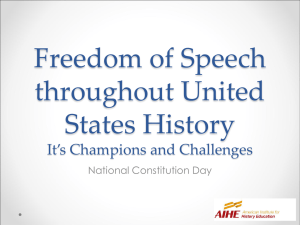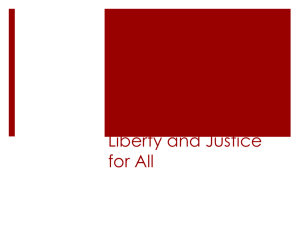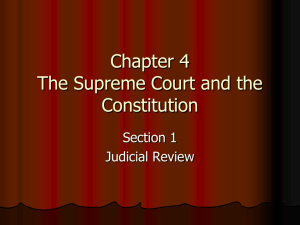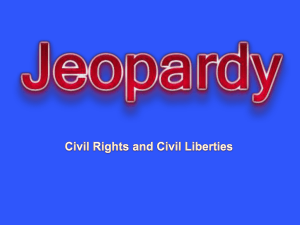Landmark Supreme Court Cases: Summary Table
advertisement
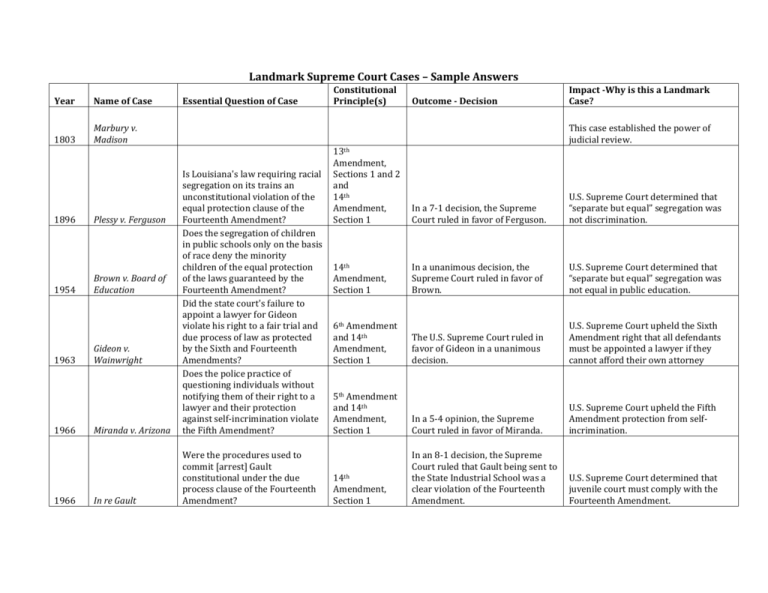
Landmark Supreme Court Cases – Sample Answers Year Name of Case 1803 Marbury v. Madison Miranda v. Arizona In re Gault Were the procedures used to commit [arrest] Gault constitutional under the due process clause of the Fourteenth Amendment? Plessy v. Ferguson 1954 Brown v. Board of Education 1966 1966 Gideon v. Wainwright Constitutional Principle(s) Outcome - Decision Impact -Why is this a Landmark Case? This case established the power of judicial review. Is Louisiana's law requiring racial segregation on its trains an unconstitutional violation of the equal protection clause of the Fourteenth Amendment? Does the segregation of children in public schools only on the basis of race deny the minority children of the equal protection of the laws guaranteed by the Fourteenth Amendment? Did the state court's failure to appoint a lawyer for Gideon violate his right to a fair trial and due process of law as protected by the Sixth and Fourteenth Amendments? Does the police practice of questioning individuals without notifying them of their right to a lawyer and their protection against self-incrimination violate the Fifth Amendment? 1896 1963 Essential Question of Case 13th Amendment, Sections 1 and 2 and 14th Amendment, Section 1 In a 7-1 decision, the Supreme Court ruled in favor of Ferguson. U.S. Supreme Court determined that “separate but equal” segregation was not discrimination. 14th Amendment, Section 1 In a unanimous decision, the Supreme Court ruled in favor of Brown. U.S. Supreme Court determined that “separate but equal” segregation was not equal in public education. 6th Amendment and 14th Amendment, Section 1 The U.S. Supreme Court ruled in favor of Gideon in a unanimous decision. U.S. Supreme Court upheld the Sixth Amendment right that all defendants must be appointed a lawyer if they cannot afford their own attorney 5th Amendment and 14th Amendment, Section 1 In a 5-4 opinion, the Supreme Court ruled in favor of Miranda. U.S. Supreme Court upheld the Fifth Amendment protection from selfincrimination. 14th Amendment, Section 1 In an 8-1 decision, the Supreme Court ruled that Gault being sent to the State Industrial School was a clear violation of the Fourteenth Amendment. U.S. Supreme Court determined that juvenile court must comply with the Fourteenth Amendment. Year 1968 1974 Name of Case Essential Question of Case Constitutional Principle(s) Outcome - Decision Impact -Why is this a Landmark Case? Tinker v. Des Moines Does a ban against the wearing of armbands in public school, as a form of symbolic protest, violate the First Amendment's freedom of speech protections? 1st Amendment and 14th Amendment, Section 1 In a 7-2 decision, the Supreme Court ruled in favor of the Tinkers. U.S. Supreme Court upheld a student’s First Amendment right to engage in symbolic speech in school. U.S. v. Nixon Is the President's right to protect certain information, using his "executive privilege" power, completely protected from judicial review? Executive Privilege In a unanimous decision, the Court ruled in favor of the United States and against President Nixon. U.S. Supreme Court limited executive privilege. 2000 Bush v. Gore Did the principal's deletion of the articles violate the students' rights under the First Amendment? Did the Florida Supreme Court violate Article II Section 1 Clause 2 of the U.S. Constitution by making new election law? Do manual recounts, without consistent standards, violate the Equal Protection and Due Process clauses of the Constitution? 2007 District of Columbia v. Heller Do sections of the District of Columbia Code violate the Second Amendment? 1987 Hazelwood v. Kuhlmeier 1st Amendment Article II, Section 1, Clause 2 and 14th Amendment, Section 1 2nd Amendment The Supreme Court ruled against the students in a 5-3 decision. The Supreme Court, in a 5-4 decision, ruled that the Florida Supreme Court's recount order was unconstitutional because it granted more protection to some ballots than to others, violating the Fourteenth Amendment’s Equal Protection Clause. In a 5-4 decision, the Court determined that the Second Amendment protects an individual’s right to possess a firearm unconnected with service in a militia, and to use that firearm for traditionally lawful purposes, such as self-defense within the home. U.S. Supreme Court determined that the First Amendment does not protect all types of student speech in school. U.S. Supreme Court determined that states cannot violate the Equal Protection Clause under the Fourteenth Amendment when undertaking election recounts. U.S. Supreme Court upheld that the Second Amendment protects an individual’s right to possess a firearm.



